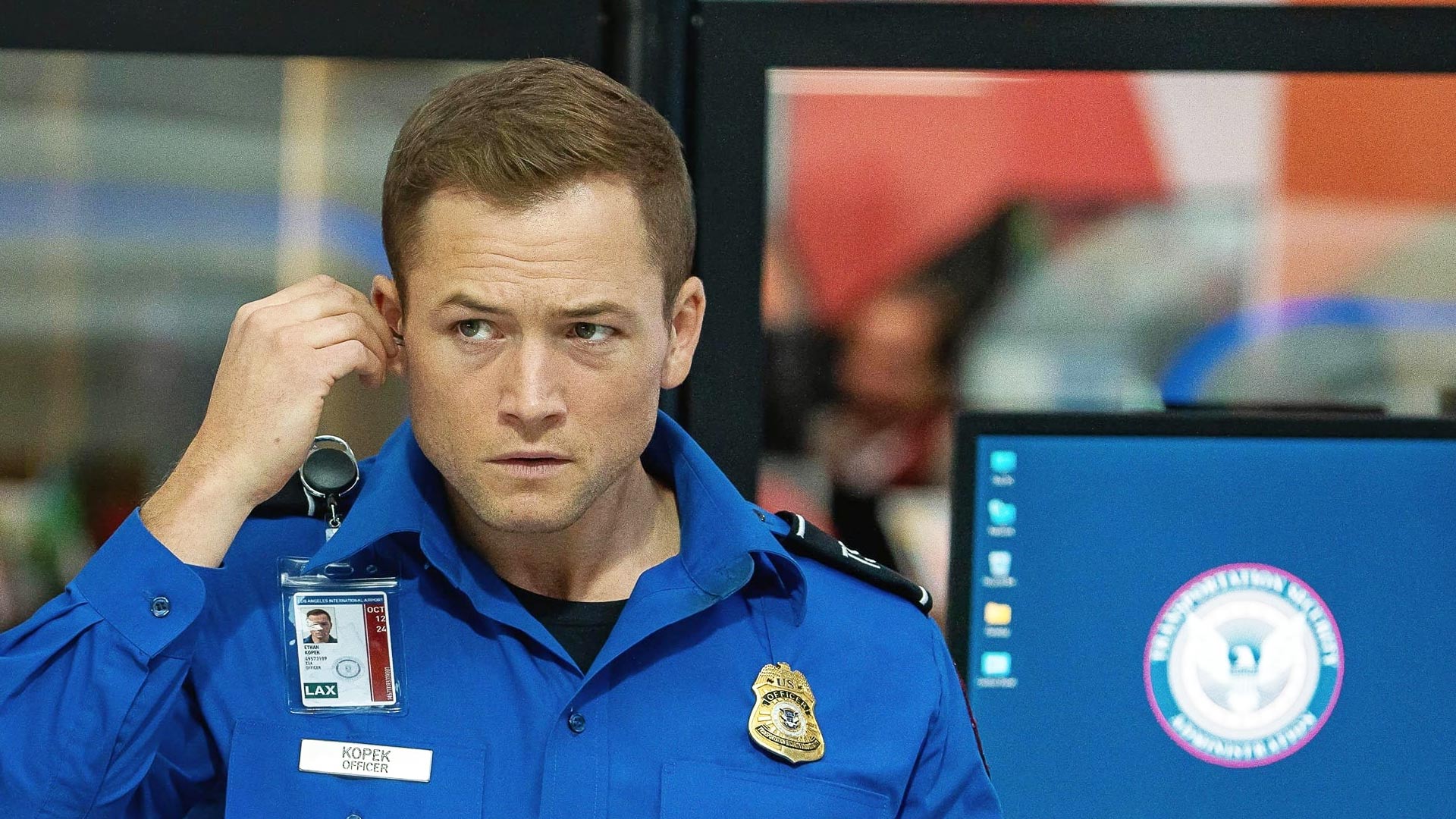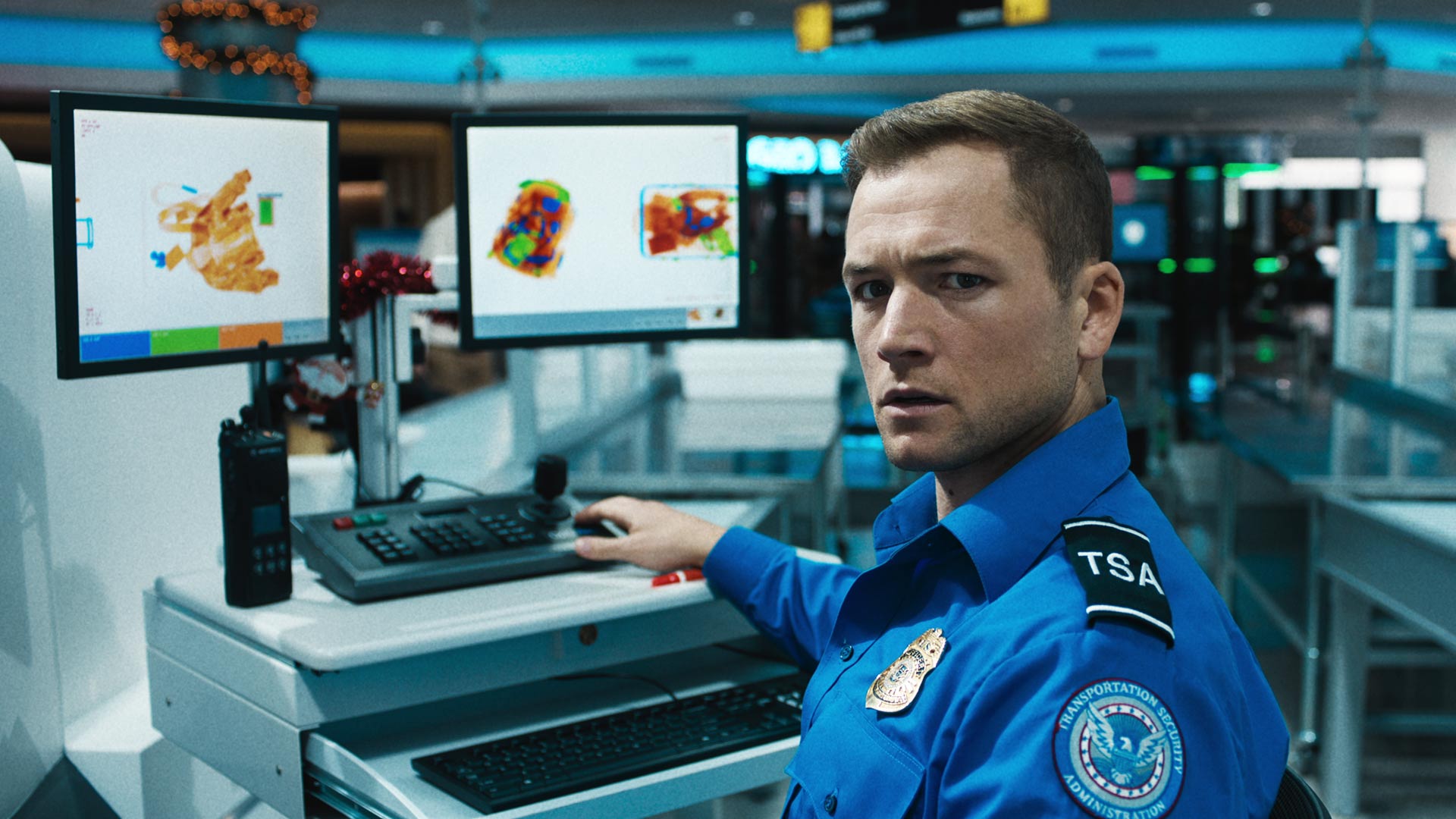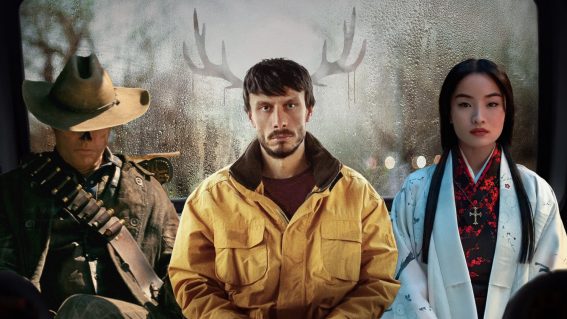Why Carry-On gets away with so many silly plot twists

Netflix’s rollicking action movie Carry-On is packed full of illogical plot developments, but does anybody care? Luke Buckmaster explains why we’re happy to go with the flow.
All we want for Christmas is a rootin’-tootin’ popcorn movie full of absurdly implausible twists. In that sense Christmas, as they say, comes early with Carry-On, Netflix’s yuletide action/thriller about a coasting-through-life airport security guard who finally musters the courage to ask for a promotion. The gods reward Taaron Egerton’s Ethan by making him the target of an ice cool terrorist, known only as Traveler (Jason Bateman), who says—merry Christmas!—he’ll kill Ethan’s pregnant girlfriend if he doesn’t allow a particular bag to pass through. The bag does not contain candy canes.
This MacGuffin sets in motion a chain of events that run the gamut from faintly plausible to outrageously improbable. The film reminded me of a concept Alfred Hitchcock invented known as “fridge logic,” which refers to bold plot developments viewers accept at the time—while engrossed in the story—but are later hit by their sheer ridiculousness, when you’re at home “pulling cold chicken out of the icebox.” The concept isn’t a perfect fit with Carry-On, because director Jaume Collet-Serra and screenwriter T.J. Fixman unpack plenty of twists that smack you on the kisser with their sheer improbability, right as they’re unfolding: you don’t need time to notice it.
And yet, audiences probably won’t care; for the most part I didn’t. The reasons we’re happy to gobble up so much hokum involve smart decisions made in the first half that build goodwill, and set a rollicking pace that flows into the second. Firstly there’s the selection of an interesting key setting, both mundane yet inherently dramatic: airport security checkpoints. These spaces are thoroughfares where, almost all the time, nothing happens, though there’s something inherently unsettling about them—even for those of us not attempting to sneak through Novichok nerve agents. We know that every once in a while, when we’re not around, the shit goes down, fuelling a sense of dramatic possibility.
When baggage scanners examine our carry-on luggage with those fancy all-seeing x-ray machines, the question of whether particular items make it through really does seem to come down to the judgement of an individual. And every individual is fallible. This is another effective part of Carry-On’s premise: it’s plausible that a terrorist could blackmail an employee into allowing something contraband to pass through.
In cinematic terms, this means communication lines must be established between diametrically motivated parties, creating a cat-and-mouse game between hero and villain. One of Carry-On‘s central implausibilities is also its most out in the open: Ethan communicates to Traveler via an earpiece nobody ever notices. We care the least about this because it’s so crucial to the dynamic between the leads. Like in Speed and The Taking of Pelham One Two Three, the hero and villain speak to each other throughout the runtime but rarely share the frame, building anticipation for an in-person confrontation.

Ethan and Traveler’s tête-à-tête enters a familiar pattern: the hero must push back; the all-knowing villain must prove he’s deadly serious; the hero must use all his nous and mettle to eventually gain the upper hand. Like in Joel Schumacher’s ripsnorting thriller Phone Booth, in which Colin Farrell’s everyman gets targeted by Keither Sutherland’s game-playing sniper, Bateman’s villain is assigned some deliciously silly dialogue establishing him as an intellectual. Somebody who’s read philosophy books; somebody who’s stared into the shadows of his psyche; somebody who‘s pondered. Initially he responds to the question “who the hell are you?” with a curt “I’m the guy you listen to.” In no time he’s reciting a parable about trees bearing fruit.
In the film’s second half (no spoilers) things get progressively more ridiculous, most annoyingly when developments feel more like storytelling convenience than plot escalation. By this point it’s clear this is a well acted film: absurd, sure, but the performances help keep it grounded in human dynamics. Bateman doesn’t lay Traveler’s sinisterness on too thick: the way he plays this character felt, to me, eerily close to his “normal” performances—exuding the same sort of charisma but inverted, ran through a funhouse mirror.
In the crucial anchoring performance, Egerton does a fine job rendering somebody to root for. We really want this guy to prevail, despite him having little in the way of personality or charisma, despite him having all the wit and flair of an instruction manual. This was what really hit me afterwards, when reaching into that proverbial icebox. Why did I care so much about a guy I don’t even want to share a conversation with? Forget all the silly plot twists: Egerton’s ability to make us care might be this film’s greatest achievement.


















